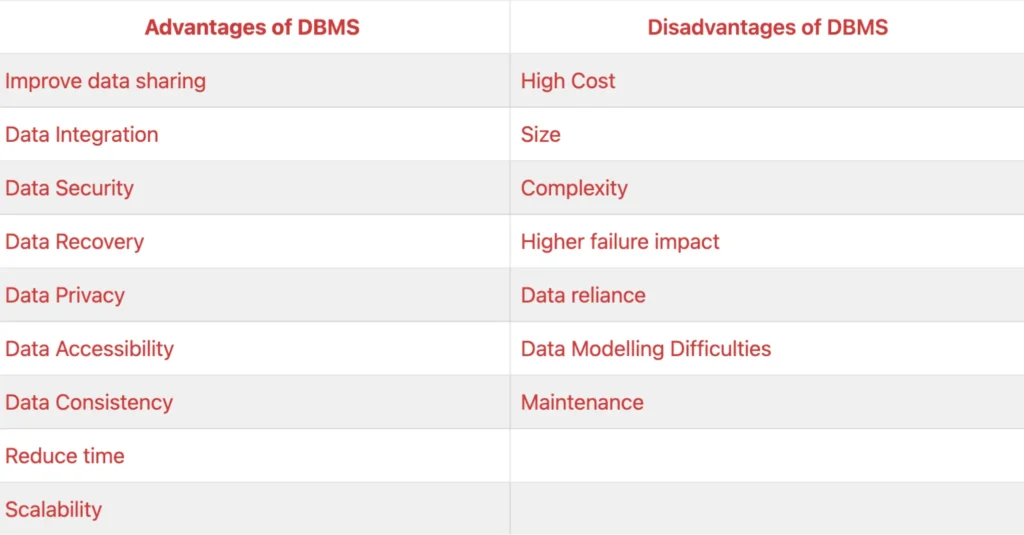Advantages and Disadvantages of Database Management System (DBMS)
Table of Contents
What is a database?
A collection of data that is interrelated and can be used to retrieve, insert, and modify data efficiently. It can also be used to organise data in a database in the form of a schema, table, views, reports, and so on. A database is usually handled by a database management system (DBMS).
Database Management System (DBMS)
Database Management System serves as an interface between the database and its end users to perform various operations like database creation, update, and manage how the operation is managed and optimised. The database management system also provides security and protection of the database and maintains data consistency in case of multiple users.
DBMS enables users for the tasks as given below:
Data Storage: A database management system (DBMS) enables users to store data in a structured and organised manner, providing effective data storage and retrieval.
Data Retrieval: Using query languages and search capabilities, users can simply access and retrieve specified data from the database.
Data Manipulation: A database management system (DBMS) allows users to add, alter, and delete data while maintaining data accuracy and consistency.
Data Security: DBMS offers security features such as user authentication and authorisation to safeguard data from unauthorised access and to ensure its integrity.
In this section we will study some of the major Advantages and Disadvantages of Database Management System (DBMS).
Advantages of Database Management System(DBMS)
Improve data sharing: DBMS makes data sharing easier among multiple users without any interference with their work. It improves collaboration and productivity and avoids the chances of data duplication.
Data Integration: DBMS provides easy integration of data from different sources. This means data can be collected from various systems and can be maintained in a single database making it quicker to access and analyse.
Data security: DBMS provides various security features such as access control, authentication, and data encryption to protect data from unauthorised access and to prevent data corruption.
Data Recovery: DBMS provides easy backups and data recovery mechanisms to save the data from loss during any errors or hardware failures.
Data privacy: The DBMS system enables the control and management of sensitive data to comply with various data privacy laws.
Data Accessibility: It makes data accessible for authorised users from any geolocation which enables data collaboration.
Data Consistency: DBMS enforces data consistency by guaranteeing that data is correct, full, and up to date. This helps to eliminate inconsistencies and errors, which can have significant consequences for a business.
Reduce time: DBMS helps to reduce development time and maintenance need providing backups, indexing, reducing manual efforts, and saving time.
Scalability: DBMS systems may be scaled to handle increasing data volumes and user loads, assuring that system performance remains stable with time.
Disadvantages of Database Management System(DBMS)
High Cost: Due to the costs of licensing, hardware, and maintenance, implementing a DBMS can be costly. This expense might be very high for smaller businesses.
Size: To execute them efficiently, it requires a huge amount of disc space and memory. The DBMS feature makes use of a significant piece of software that takes up megabytes of disc space.
Complexity: Implementing and maintaining a database management system (DBMS) can be difficult, requiring specialised expertise and skills that might raise operational expenses.
Higher failure impact: Failure has a significant influence on the database since most organisations store all their data in a single database, and if the database is damaged due to an electric outage or database corruption, the data may be lost forever.
Data reliance: Because DBMS stores data in a certain format, data reliance concerns can arise. If the format changes, the application that uses the data may be affected, resulting in higher maintenance and development expenditures.
Data Modelling Difficulties: Creating an effective database schema can be difficult, and badly designed databases can result in inefficiencies.
Maintenance: Aside from management, a database management system must be updated on a regular basis to keep the system current. Only by staying current can users obtain the utmost efficiency of a database system. However, this is not an easy undertaking because maintenance incurs large costs.
The table below provides a precise overview of the Advantages and Disadvantages of Database Management System (DBMS).

Finally, database management Systems (DBMS) provide various benefits, including efficient data administration, data integrity, and security. However, they have drawbacks such as complexity, cost, and significant performance overhead. Careful examination of your specific demands is required to evaluate whether the benefits of a DBMS exceed the negatives for your specific use case.
Read: What is Database and Characteristics of data in Database?

